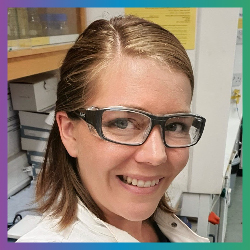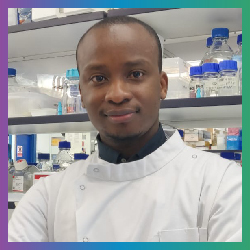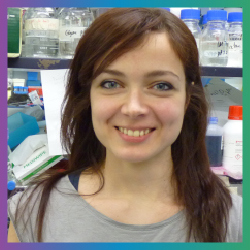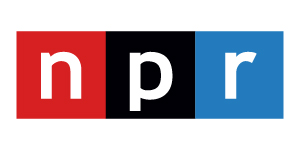A Message from Leadership
At its core, Aligning Science Across Parkinson’s (ASAP) is a research program focused on understanding the underlying science of Parkinson’s disease (PD) with the goal of amplifying and coordinating efforts around the world within and outside the existing PD community. Our program is different from traditional funders due to our ability to make large, long-term commitments; our appetite for risk and ability to support studies that might otherwise not be funded; and our steadfast belief that we can accelerate advances by fostering a collaborative and open approach to research through our open science policies.
As we reach the culmination of ASAP’s third full year, we are thrilled that we are starting to see the results of our efforts providing new insights into PD. This year was marked by our supported programs making headlines around the world, from discovering a new GBA1 variant in a Nigerian population (Global Parkinson’s Genetics Program) to validating a new biomarker assay for early diagnosis of PD (Parkinson’s Progression Markers Initiative). We could not do this alone, and are extremely appreciative of the many partners around the world for believing in our vision and mission, and embracing our commitment to open science and collaboration.
Read below to learn about what we have accomplished for the 2023 year.
Ekemini A. U. Riley, PhD
Sonya B. Dumanis, PhD
Randy Schekman, PhD
OUR MISSION:
To accelerate the pace of discovery and inform the path to a cure for Parkinson’s disease through collaboration, research-enabling resources, and data sharing.
OUR VISION:
To create collaborative and transparent research processes and environments that deliver faster and better outcomes for Parkinson’s disease.
ASAP’s Theory of Change for Open and Collaborative Science
At ASAP, we apply a Theory of Change framework, which allows us to cohesively and comprehensively measure progress – from idea to result – in the context of our overarching vision. Further, it enables us to reflect upon and iterate processes as we measure our progress to date. Our work is broken down into the three main components of our mission: collaboration, resource generation, and data sharing, which underpin our strategies for accelerating discoveries for PD.
SUPPORT COLLABORATION
GENERATE RESOURCES
SHARE DATA
ACCELERATE DISCOVERIES

Program Specific Overview & Milestones
In the following sections, we highlight some of the 2023 outputs from ASAP’s supported programs and highlight how these outputs ladder up to our objectives.
Collaborative Research Network (CRN)
Global Parkinson’s Genetics Program (GP2)
Parkinson’s Progression Markers Initiative (PPMI)
iPSC Neurodegenerative Diseases Initiative (iNDI-PD)
Accelerating Medicine Partnership in Parkinsons Disease (AMP® PD)
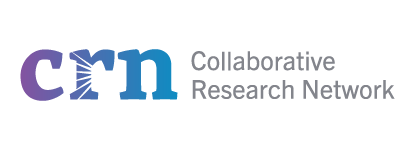
The ASAP Collaborative Research Network (CRN) is an international, multidisciplinary, and multi-institutional network of 35 teams working collaboratively to address high-priority basic science questions. Each team within the CRN is designed to support productive collaborations, include diverse talents, and embrace the values of openness and transparency to accelerate outcomes and the impact of findings. The CRN was designed to foster an environment that facilitates the rapid and free exchange of scientific ideas to spark new discoveries for PD.
35
Teams
163
Team Leads
600+
Trainees
1,300+
In Network
14+
Countries
80+
Institutions
Objective 1: Facilitate the rapid and free exchange of scientific ideas across the teams that we fund
Releasing Findings Earlier
As of December 1, 2023, we have collectively supported 164 peer-reviewed publications, of which 46 were reviews and 118 were original research articles. Additionally, there are 96 preprints posted that are still under review at various journals. As part of our collective commitment to open science, CRN teams post preprints on an average of 5.5 months before they are released for final publication. Our preprints have been downloaded over 130,000 times and cited one-to-two times on average before final publication. Findings from our CRN were shared through original research articles that spanned across multiple disciplines, ranging from insights into endolysosomal and mitochondria pathways to understanding synuclein biology to circuitry physiology and function in PD. Our literature reviews showcased thought leadership around emerging topics from endolysosomal and mitochondrial pathways to inflammation and immune regulation to PD modeling.
Learn more about the articles – including preprints, publications, and reviews – by looking at our ASAP Catalog. You can also stay up to date on the latest ASAP-funded preprints and the latest published articles.
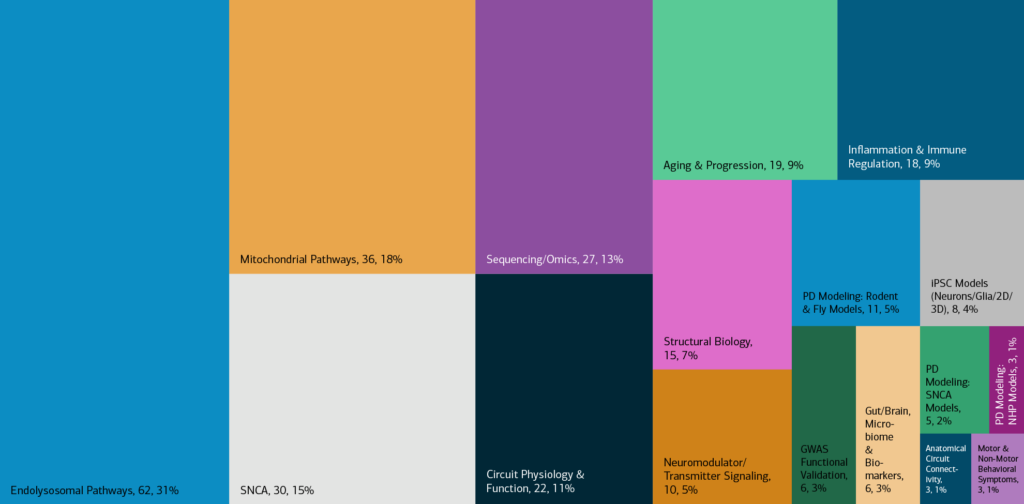
Increasing Connections at Collaborative Meetings
This year, more than 400 members of the CRN attended our Collaborative Meeting Series (San Diego or London) to collectively tackle the emerging themes and controversial topics within the PD field. To support professional development, we also welcomed 165 trainees from all teams to participate in these in-person meeting events. Our goal was to create a space for idea exchange that spanned career levels, disciplines, and continents.
Across both convenings, 26 trainees and project managers received awards based on either their research posters or data blitz talks, which highlighted their contributions to the PD field.
In our post-meeting surveys, 90% of attendees reported that they identified new collaborations. Additionally, 76% of attendees indicated that they would reshape their research plans based on meeting discussions.
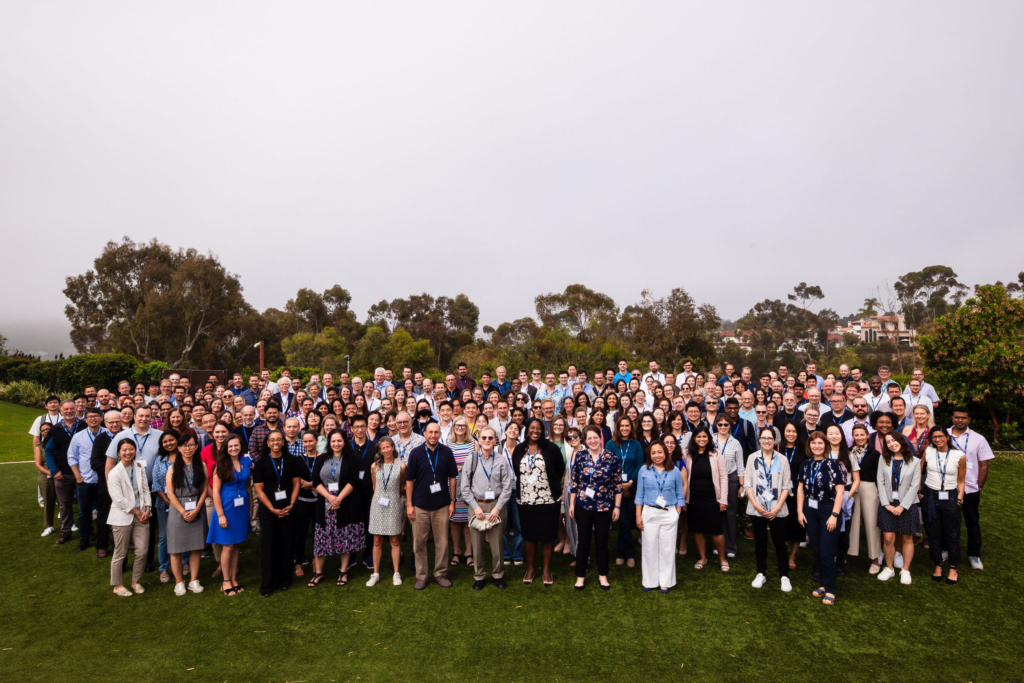
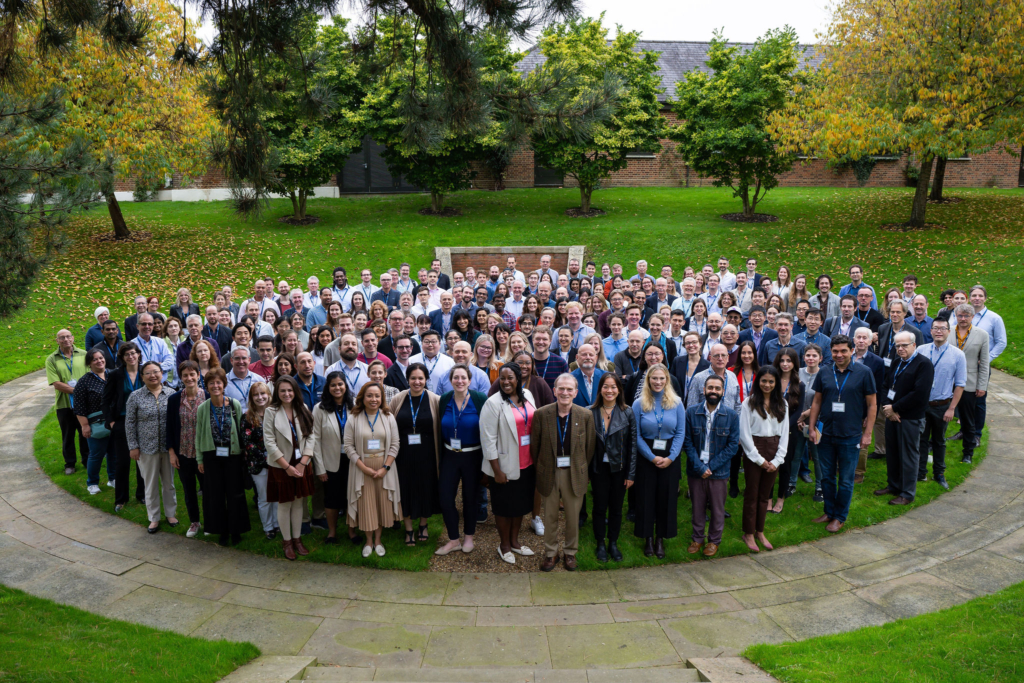
Holding Virtual Events
Throughout the year, members of the CRN met virtually to discuss findings around a variety of topics from endolysosomal pathways to GWAS findings to immunology. In 2023, there were 35+ virtual special interest group events. Preliminary data was shared in every meeting.
Facilitating Connections with the Outside Research Community
In addition to supporting internal meetings for our network, we are also proud to support research events open to the public at large, such as the virtual LRRK2Central and Mito911 webinar series dedicated to showcasing the latest research on LRRK2 and mitochondria, respectively. We also supported the 2023 Parkinson’s Disease Gordon Research Conference, UC Berkeley’s Cell Biology of Neurodegenerative Disease conference, the 16th Congress of the International Society of Neuroimmunology, and Stanford’s Second Annual Cell Biology of Parkinson’s Disease Conference centered on presenting unpublished data and new research resources.
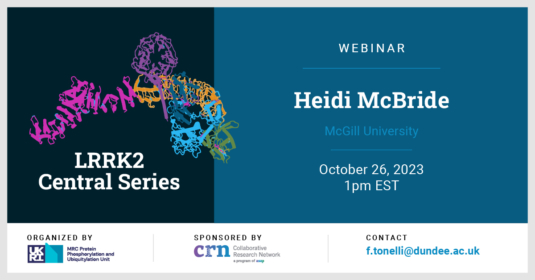

Supporting Our Workforce
We cannot develop therapies and/or a cure for PD without the scientific workforce. In 2023, we piloted a childcare stipend program for CRN members to support the retention of graduate students and early-career researchers in neuroscience and related fields by providing resources to offset rising costs of childcare. We are thrilled to announce that we were able to support 99 members within our network with childcare stipends up to $10,000 per household.
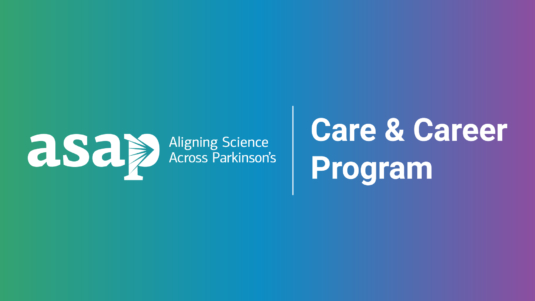
Objective 2: Ensure that the research we support can be leveraged for future discoveries and meta-analysis
Sharing Resources
The CRN is committed to openly sharing their contributions with the research community. More than 1,000 ASAP-generated research outputs have been shared to date, including blog posts, articles, protocols, datasets, code for analytical pipelines, and lab resources such as plasmids, cell lines, and animal models.
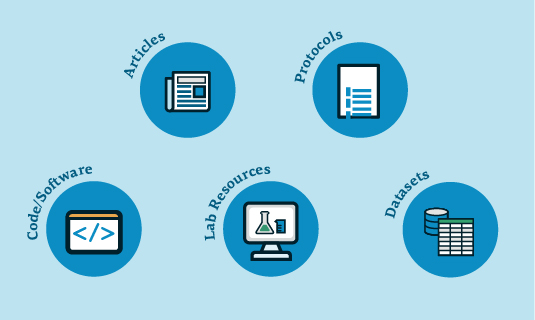
Launching Protocol Particulars
We are committed to furthering the spread of knowledge and enhanced equity across the scientific community through promoting transparent research practices and enabling others to replicate the work. The CRN has shared over 600 methods through the protocols.io platform, and the research community has been actively engaging with these protocols. This has resulted in over 66,000 exports, and over 155 comments and 190 bookmarked pages.
This year, ASAP launched a new interview series – Protocol Particulars – to highlight ASAP-generated protocols. The videos, which feature the protocol authors, highlight how the protocol relates to specific ASAP projects and provide detailed troubleshooting tips. Protocol Particulars aims to further the spread of knowledge and enhance equity across the scientific community through promoting transparent research practices and enabling others to replicate the work.
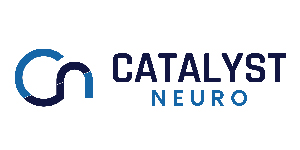
Promoting Best Practices for Curating Neurophysiology Datasets
A common question we get from our circuitry teams is about the best practice for depositing neurophysiology datasets. These datasets are large file sizes and depending on the equipment used, come in various file formats. In 2023, we launched a pilot with CatalystNeuro to work with ASAP labs and build out bespoke conversion pipelines to the Neurodata Without Borders (NWB) format to set up auto transfer procedures that allow easy archiving of these datasets onto DANDI, the NIH BRAIN initiative-sponsored neurophysiology repository.
Developing a Cloud-based Solution for ASAP Generated Human Postmortem Brain Derived Omics Data
Postmortem brains are precious resources. There was a human behind each of these samples. 14 CRN teams are using human brain tissue for their research, and we want to ensure that any promising data emerging from these resources can be replicated rapidly, that meta-analysis of the resulting data is feasible, and that data, methods, and ideas can be shared easily both within the network and also with the broader research community. In 2023, ASAP awarded a joint contract between DNAStack, DataTecnica International, and Verily to support the development of a cloud-based solution that would house all of this data in a central location. Already, eight teams have committed to uploading their data and we will be releasing this platform publicly in 2024!
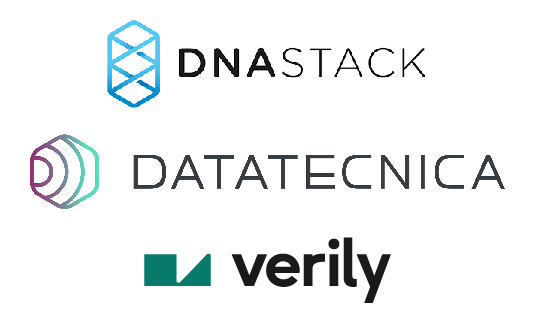
Objective 3: Funnel new ideas into the PD research and discovery process
CRN in the News
CRN teams made discoveries across a number of research efforts. Here is a snapshot of press releases and news stories from 2023 that highlight findings from CRN teams.
PD FUNCTIONAL GENOMICS

Red/yellow brain pigment linked to Parkinson’s disease: Study highlights the work of Xiqun Chen/Team Chen

Finding rewrites understanding into Parkinson’s disease pathway shares findings from Sascha Marten and Michael Lazarou/Team Hurley

Brain’s hidden “junk” – mysterious RNA circles produced by cells damaged in Parkinson’s and Alzheimer’s disease highlights findings from Xianjun Dong and Clemens Scherzer/Team Scherzer
NEURO-IMMUNE INTERACTIONS

Parkinson’s disease: Essential role in neuroinflammation found for a subset of brain macrophages reports findings from Ashley Harms/Team Sulzer

Study adds to evidence that Parkinson’s starts in the gut outlines findings from David Sulzer/Team Sulzer
CIRCUITRY AND BRAIN-BODY INTERACTIONS

New study puts gut microbiome at the center of Parkinson’s disease pathogenesis highlights findings from Haydeh Payami/Team Liddle

Dopamine neurons may be more diverse than thought highlights findings from Rajeshwar Awatramani and Daniel Dombeck/Team Awatramani
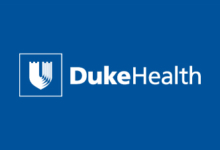
Nanoplastics promote conditions for Parkinson’s across various lab models reports findings from Andrew West/Team Liddle
Demonstrating Impact
This year, we launched a Catalyzing Impact page and impact pages for all 35 CRN teams to highlight their respective contributions and outputs to the PD research field, along with recognition and engagement in our CRN research community.
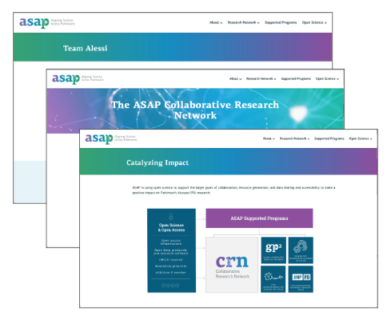
As 2023 comes to a close, we look ahead to 2024, where existing teams in the CRN can apply for competitive renewals to expand upon their work. In 2024, we will also begin planning for a new call open to all researchers, with the goal of announcing new funding opportunities at the beginning of 2025.
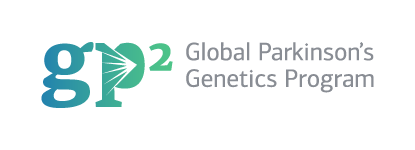
GP2 aims to understand the genetic architecture of PD and make that knowledge globally relevant. To this end, GP2’s goal is to collect and genotype over 200,000 unique samples from around the world, especially from diverse populations to further our understanding of the genetic architecture of PD, and to ensure ancestral diversity is included in PD research. In 2023, GP2’s funding was extended to expand efforts for research in geographic areas traditionally underrepresented in research and also to begin studying Parkinson plus syndromes (including progressive supranuclear palsy [PSP], multiple system atrophy [MSA], and corticobasal syndrome [CBS]) atypical Parkinsonism cases of PD and individuals with markers of prodromal disease cases (e.g., hyposmia and REM sleep behavior disorder).
Objective 1: Include ancestral diversity information in PD genetic datasets and share these harmonized datasets with the global research community
Harmonizing Existing Efforts and Supporting Ongoing Initiatives
As of November 2023, GP2 is working with 76 member institutions that are sharing data from 147 cohorts across 59 unique global locations on six continents. Collectively, over 163,000 samples have been committed to date. Submit a cohort by emailing [email protected].
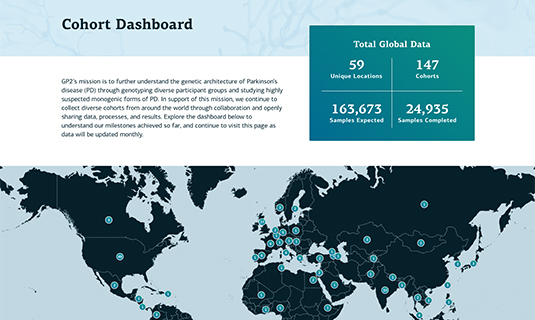
Increasing Geographical Representation
Through expanded outreach efforts in 2023, GP2 now has new cohorts in our network representing populations in Bangladesh, Mongolia, Sri Lanka, and the Philippines.
Expanding The Black and African American Connections to Parkinson’s Disease (BLAAC PD) Study
An initiative of GP2, BLAAC PD is a U.S.-based study with the goal of increasing recruitment to expand our understanding of PD within the Black and African American community. To aid these efforts, BLAAC PD selected four new sites that will join the study’s efforts in 2024. The selected sites include UTHealth Houston, TX, Washington University School of Medicine in St. Louis, MO, University Hospitals Research & Education Institute in Cleveland, OH, and Medical University of South Carolina in Charleston, SC.
Contributing to PD Knowledge Among Veterans
VET-PD, an initiative in partnership with the U.S. Department of Veterans Affairs, started recruiting in 2023. VET-PD will recruit 1,000 non-white veterans and 1,000 white veterans over two years to contribute to GP2 and help expand our understanding of PD in diverse ancestries, particularly in veterans who may be at higher risk for PD.
Developing the Infrastructure to Promote PD Genetics Research
In 2023, GP2’s Complex Disease Data Analysis and Monogenic Data Analysis Working Groups uploaded the fourth and fifth data releases to the Terra platform in collaboration with AMP® PD. As of December 7, 2023, GP2 has 24,935 completed samples that have been processed and shared on the AMP® PD platform. A high-level look at all data and ancestry breakdown is always available on our Cohort Dashboard. We anticipate our sixth data release to be out in early 2024. Additionally, summary statistics from all GP2-released datasets are incorporated into the Neurodegenerative Disease Knowledge Portal hosted by the Broad Institute.
Objective 2: Continual analysis of data collected by GP2 to contribute to the genetic knowledge base
GP2 in the News
In August, GP2’s discovery of a new GBA1 gene variant specific to individuals of African and African-admixed ancestry was published in The Lancet Neurology.
This variant conveys significantly increased risk of developing PD by 1.5 fold when having 1 copy and 3-4 fold if both copies of the variant are inherited. While common in a Nigerian PD cohort and other West African countries, this variant is incredibly rare in other world populations, and as such, went undiscovered until GP2 released their findings. Our hope is that this finding serves as a catalyst for ensuring genetic diversity is represented in research. News outlets covering the finding included:
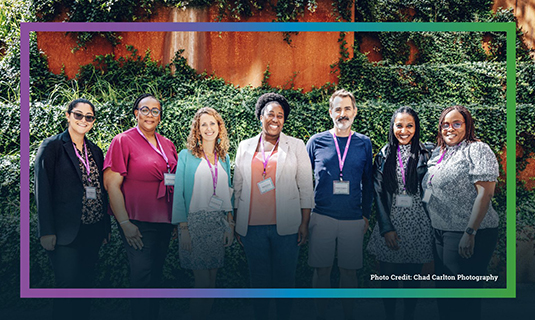
Other thought leadership to highlight from GP2 includes:
- The preprint, “Multi-ancestry genome-wide meta-analysis in Parkinson’s disease,” originally uploaded in 2022, went under heavy revision and has been accepted for publication following two rounds of review at Nature Genetics. This manuscript identified 78 independent genome-wide significant loci, including 12 potentially novel loci across populations, and lays the foundation for future efforts aimed at identifying PD loci in non-European populations.
Creating Tools that Facilitate Findings
2023 was a busy year for GP2’s working groups and partners for developing new analytical tools. Check out our GitHub repository, GP2code, which follows the industry standard for open science code sharing.
Objective 3: Establish a strong diverse global research pipeline of next generation of PD researchers
Hosted Second Annual In-Person GP2 Meeting
In late August, over 270 members of the GP2 network gathered in Copenhagen, Denmark, for our second Annual Investigators Meeting. Participants represented over 60 countries! Check out our recap and read trainees’ accounts of the convening.
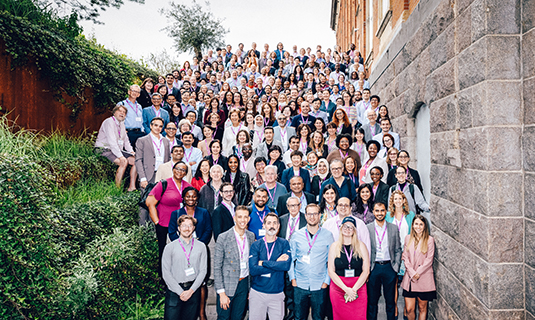
Growing and Supporting Our Training Network
- GP2 continues to support PhD and MSc opportunities related to genetics and PD for graduate students from underrepresented regions (URP) of the world. In the fall of 2023, seven new trainees and supervisors were selected for the URP PhD program. The successful applicants come from Chile, Brazil, Argentina, South Africa, Algeria, Malaysia, and Australia.
- In October, representatives from 18 sites across 10 countries/territories within Latin America gathered in Cali, Colombia, to discuss progress within LARGE-PD, a cohort that is contributing to GP2’s dataset. GP2 was thrilled to be part of this event.
- In 2023, the trainee network grew to over 180 members. As a way of connecting learners to all of GP2’s offerings, we introduced Trainee Representatives. Currently, seven individuals from Asia, Latin America, Africa, Western Europe, and Eastern Europe are able to help answer questions and guide learners through our training catalog. See More.
- Thanks to many volunteers, we developed three new training courses, which are on our virtual learning platform and range from Introduction to Python to Research Methods II.
- Expanding our in-person training opportunities, we hosted two in-person workshops in India and Mexico, and one hackathon in Sweden.
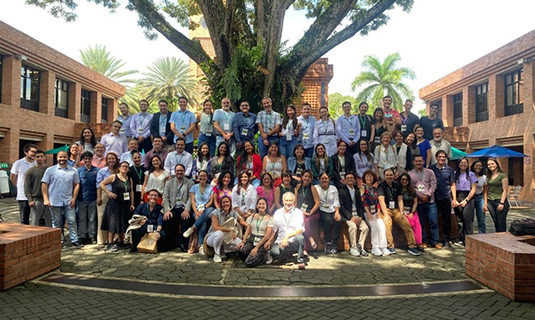
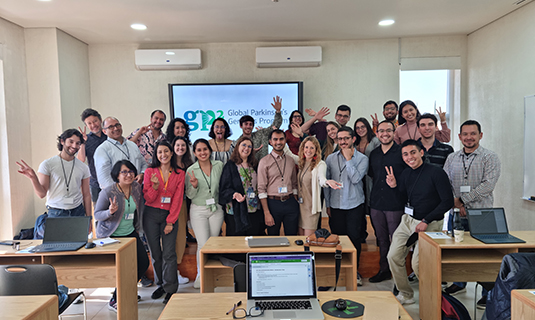
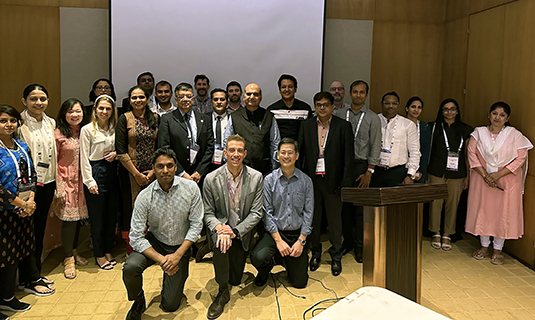
As we wrap up our efforts in 2023, GP2 maintains its commitment to global collaboration and open data, developing tools, and providing training and resources to improve our understanding of the genetic architecture of PD and make this knowledge globally relevant.
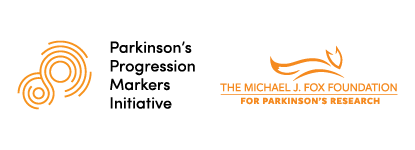
The Parkinson’s Progression Markers Initiative (PPMI) is a landmark observational study focused on supporting worldwide strategies for investigating and defining biomarker signatures of PD risk, onset, and progression. PPMI makes its dataset and biorepository – the most robust in PD to date – available to academia and industry to accelerate breakthroughs. ASAP is proud to participate alongside other PPMI study partners in efforts to develop worldwide comprehensive strategies to define and measure PD to speed therapeutic development.
Objective 1: Center research around the lived experience, supporting continued clinical site visits for annual testing and remote collection efforts and ensuring this is the largest natural history study for those with PD and those that are at risk
Increasing Participation in Studies
- Over the course of 13+ years since the study began, over 2,300 individuals have enrolled to participate at clinical sites and nearly 40,000 participants have joined online.
- This study would not be possible without the amazing commitment of PPMI participants who return for additional testing to our clinical sites on an annual basis. PPMI retention rates for collecting lumbar punctures and additional brain scan imaging is around 80% for the 2023 year.
- Because loss of smell can be an early sign of Parkinson’s onset, PPMI launched the smell test challenge in 2022. Over 15,500 individuals have participated to date. Those that have low smell test scores are invited in for further testing and follow up. This year, the PPMI smell test challenge went international – launching in Canada, the U.K., and the Netherlands.

Objective 2: Investigate and define the biomarker signatures of prodromal PD
Increasing Data Usage
To date, the PPMI datasets have been downloaded over 17 million times by other researchers working on PD. These datasets have also informed the design of over 20 different clinical studies testing PD treatments.
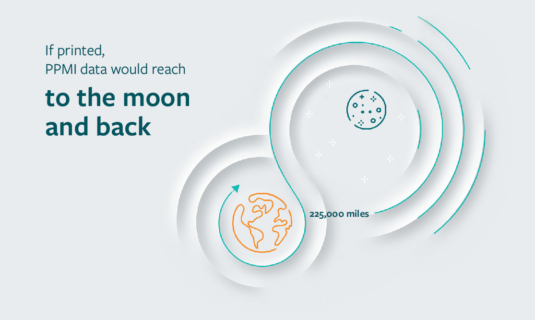
PPMI in the News
In April, PPMI work demonstrated how αSyn-SAA could be a novel tool for precision medicine approaches, earlier intervention, and improved clinical trial design for PD. We are proud to contribute to this effort that has the potential to transform the way we diagnose, treat, and manage PD. Articles that covered this announcement include:
Made New Findings
Based off those aSyn-SAA findings and additional data from PPMI and other studies, an international working group representing diverse stakeholders conceptualized a new biological staging paradigm for PD enabling identification of individuals with biomarkers of Parkinson’s and biologically related disorders prior to clinical symptom onset for enrollment into clinical trials to advance therapeutic development.
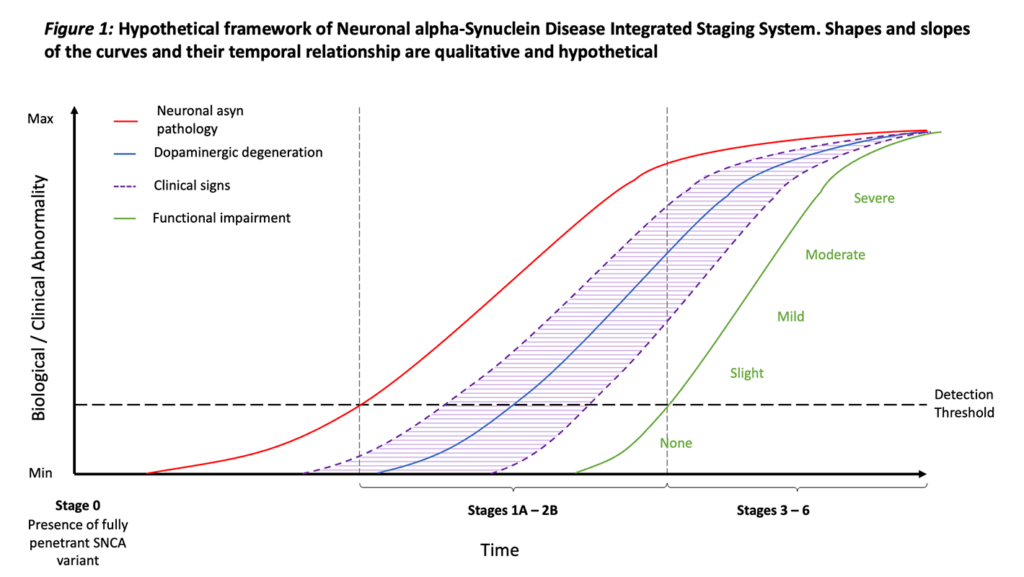
In 2023, PPMI investigators:
Published a study looking at autonomic symptoms (such as gastrointestinal, urinary, and cardiovascular issues) that could be present in early stages of PD.
Studied whether dopamine deficits were also linked to cognitive impairment in PD.
Examined various metrics that could predict who might be a slow to fast progressor of Parkinson’s symptoms.
We are grateful for our collaboration with The Michael J. Fox Foundation and PPMI. By supporting the expansion of PPMI in 2020, the initiative is now able to increase recruitment efforts and remote testing for those at risk for PD with the goal of developing novel tools for precision medicine approaches and earlier intervention strategies, providing a ready platform for future discoveries.

The iPSC Neurodegenerative Disease Initiative (iNDI-PD), anchored within the NIH Center for Alzheimer’s and Related Dementias (CARD), is the largest genome engineering initiative in research to date. ASAP supports iNDI-PD, an extension of the iNDI research initiative that is making induced pluripotent stem cell (iPSCs) resources accessible to all researchers interested in understanding PD to discover novel insights into the molecular biology of disease and to ensure that additional mutations relevant to PD research are also included in their efforts. By incorporating PD data in the neurodegenerative resource bank, we are also enabling researchers to draw connections across diagnostic lines.
Objective 1: Expand the Human iPSC catalog at Jax Laboratories to include Parkinson’s mutation cell lines

Establishing the Availability of Cell Lines
Of the 19 projects listed above, SNCA p.A53T, SNCA p.E46K, and LRRK2 p.R1441G are already available on the JAX Website. 12 additional cell line trios (heterozygous, homozygous, and wildtype clones) were generated and shipped to Jax Lab for distribution. These lines are undergoing the last QC steps before being made publicly available by Q1 2024.
Objective 2: Create isogenic revertant controls for commonly requested PPMI cell lines
Making Data Widely Available
Nine different isogenic revertant control iPSC cell lines from the PPMI biobank for common variants of LRRK2, GBA, and SNCA have been generated and returned to Indiana University which distributes all PPMI available cell lines.
We are proud to support iNDI-PD and ensure that additional genetic mutations relevant to PD research are included in this effort. We are now in the process of evaluating whether we should continue to support additional efforts to ensure other PD mutations are included in the catalog as well as having these mutations on diverse iPSC backgrounds. Stay tuned! Please note that as the iNDI-PD resources become available, we want researchers to be able to use them as needed. If you are interested in receiving alerts as new lines become available:

The Accelerating Medicine Partnership in Parkinson’s Disease (AMP® PD) is a public-private partnership between the National Institutes of Health (NIH), multiple biopharmaceutical and life science companies, and nonprofit organizations. Managed through the Foundation for the NIH (FNIH), AMP® PD aims to harmonize PD datasets across the community with the goal of identifying and validating diagnostic, prognostic, and/or progression biomarkers for PD, with an emphasis to broaden data sharing in the biomedical community to advance PD research. ASAP is proud to be a partner in the AMP® PD effort to broaden data sharing in the biomedical community to advance PD research. Both GP2 and PPMI cohorts share their data on this platform.
Objective 1: Collect and harmonize large-scale PD datasets in order to support analytics for open analysis by the research community
Releasing Data on the AMP® PD Platform
- Made all five GP2 dataset releases available on the platform through the GP2 – AMP® PD Partnership.
- Released additional data, which includes:
- Postmortem Brain Cohort from 100 participants with clinical data, whole genome sequence, and RNASeq data with samples from 5 brain regions
- Untargeted Proteomics Data from 621 participants analyzing both plasma and CSF
- Normalized Targeted Proteomics Data across two cohorts (PDBP and PPMI) in 5 targeted CSF and plasma assays
Supporting Analytics for Open Analysis
- Launched Target Explorer, a public resource for exploring nominated genes and proteins from AMP® PD data to improve validation of targets.
- Released seven different community workspaces to support data analysis. Note that some of these may require Tier-2 access (Register for Access). Workspaces released include:
- AMP® PD Tandem Repeat Expansion Pipeline Workflows
- Accelerating Parkinson’s Diagnosis using Multi-omics and Artificial Intelligence
- AMP® PD Simulated Proteomics Data Set
- Terra Workspace Updates: Getting Started with Proteomics Notebook examples to use the Bridged Targeted Proteomics dataset
- Terra Workspace Notebooks: Getting Started Notebooks for using and analyzing Untargeted Proteomics
- Target Explorer Transcriptomics Differential Expression
- Target Explorer Differential Protein Expression
- Hosted a Kaggle competition to encourage researchers to access the data and improve predictive algorithms for Parkinson’s progression using AMP® PD data. Over 40,764 entries from 1,805 teams were received and three prizes were awarded.
Our partnership in the AMP® PD effort is a meaningful example of the importance of collaboration, resource generation, and data sharing to accelerate discovery for PD research. To date, over 1,200 users have registered for access to the platform. Within AMP® PD, researchers can access eight different cohorts with common clinical and genomic data along with GP2 datasets.
Open Science
2023 was the Year of Open Science. Since our inception, open science has been at the heart of our mission and work. By supporting open science, we facilitate the rapid and free exchange of scientific ideas, ensuring that the research we fund can be leveraged for future discoveries.
Objective: Establish ASAP as a thought leader in open science practices and support open science implementation frameworks
Pioneering a path for open science
- In supporting our grantees, we have provided over 150+ compliance reports across our support programs this year, ensuring that research outputs are registered, deposited, and publicly linked in final publications.
- Our publication entitled “From Policy to Practice: Tracking an Open Science Funding Initiative” evaluates our effectiveness in improving research output sharing using new tools developed by DataSeer.ai for all articles processed through the compliance workflow. We hope this article assists other funders and institutions as they consider open science implementation.
- During the year, we conducted over 20 team trainings focused on implementing open science practices across funded research teams.
Actively Engaging with the Broader Open Science Community
- ASAP participated in the 2023 Year of Open Science to facilitate the rapid and free exchange of scientific ideas and inspire more researchers to adopt open science practices.
- Managing Director Dr. Ekemini A. U. Riley participated in the Future of Health Summit discussing our Blueprint for Collaborative Open Science to enable open science practices and increase research transparency.
- Deputy Director Dr. Sonya Dumanis participated in the Scientific, Technical, and Medical (STM) US Annual Conference 2023 and discussed how and why ASAP makes research data available to the science community.
- Sonya Dumanis also served as a judge for the 2023 Neuro-Irv and Helga Cooper Foundation Open Science Prizes.
- Open Science Lead, Dr. Matt Lewis, participated in ICOR’s Public Meeting Series to share ASAP’s experience on implementation of our open science workflows.
- ASAP continues to be an active member of both CoalitionS and ORFG.
- We developed a series of open science personas to showcase the breadth and depth of open science and how varying approaches operate in research practices.
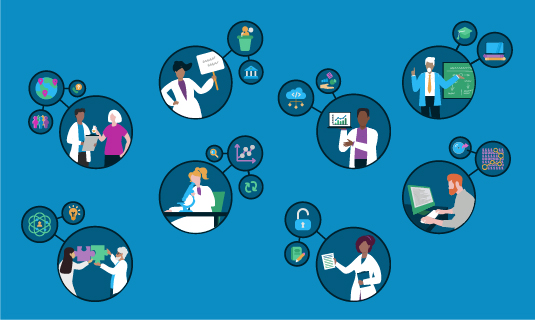
We are excited to be pioneering a path of open science for the ASAP community and the research community at large. We encourage you to get updates on our ASAP activities throughout the year.
Thank You to Our Partners
We are grateful for the organizations who have worked with us over the years to implement our vision: our implementation partner, The Michael J. Fox Foundation, and our long-time collaborators, Stratos, DataSeer, Parkinson’s Foundation, Parkinson’s UK, and AMP® PD.
We are thrilled to be working with new partners such as CatalystNeuro, to support the curation of large neurophysiology datasets and DNAStack, DataTecnica International, and Verily, who are working together to build out a CRN Cloud to house all of the omics datasets generated by the CRN. Our goal is to sync this platform to the AMP® PD platform, ensuring interoperability within the research ecosystem.
The complexities of PD are immense. But together, our collective commitment to better understand the underlying causes of PD has allowed us to achieve major discoveries and the above outputs throughout 2023. We look forward to continuing our efforts in the new year.

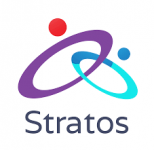





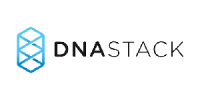

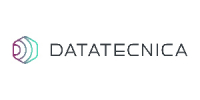
Closing from Leadership
We are proud of the novel discoveries and progress made in 2023 toward our vision of advancing collaborative, transparent research processes, and environments that deliver faster and better outcomes in PD research. We at Aligning Science Across Parkinson’s (ASAP) thank the Sergey Brin Family Foundation for their generous support in funding this initiative, our partners, the research community, research participants who shared their biology, and all our stakeholders for the contributions they have made to our research network and the entire neuroscience community. We look forward to our continued partnership and research community efforts, propelled by the success of 2023, the discoveries made, and the lessons we have learned. Here’s to a productive 2024!




